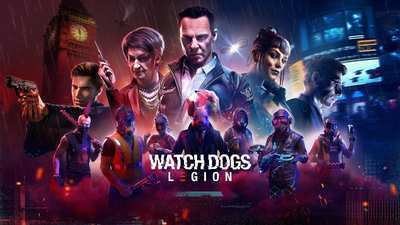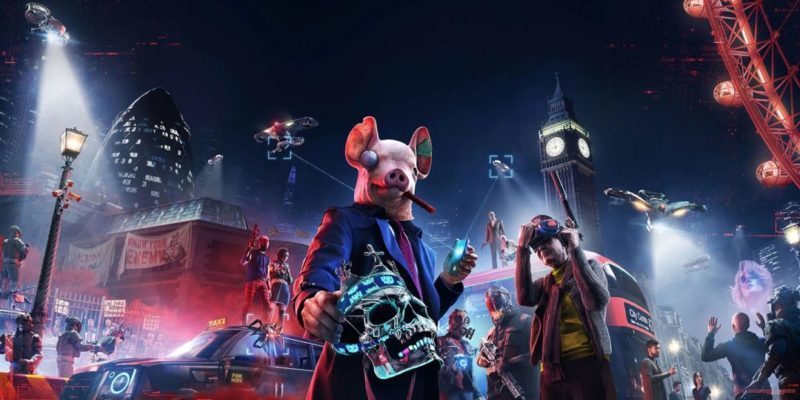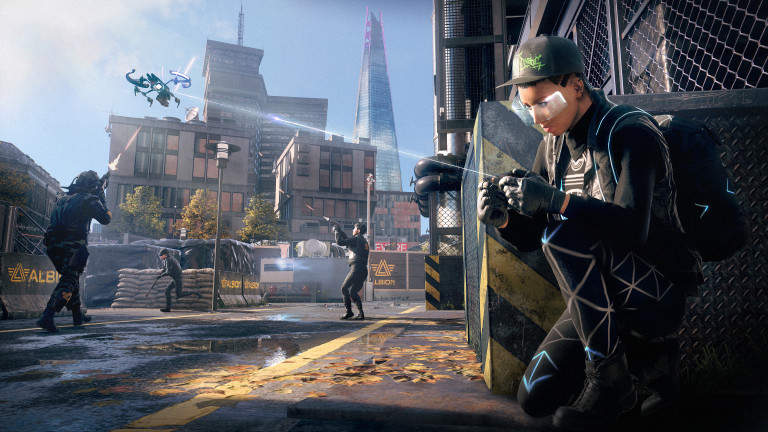Recruit the Technological Revolution in Watch Dogs: Legion

The city of London becomes a tech playground for gamers to hack in Ubisoft’s “Watch Dogs: Legion,” a third game in this franchise about destroying Big Brother, and one of the launch games for the PS5. Sprawling and ambitious, the game brings the entire city to life in a way that can sometimes feels a little clunky but also hints at a future of true open-world gaming. Imagine an open-world game in which everyone you meet can be recruitable to your cause and eventually playable. At its best, “Watch Dogs: Legion” feels alive with its deep sense of authorship over not just a deep catalog of customizable things like outfits and weapons but even who you bring aboard your team of revolutionaries. Like a lot of games like this, it has a habit of getting disappointingly repetitive at times, and there were some truly clunky glitches on the PS4 version I used for this review like cars driving through each other and NPCs caught in loops (although these could be patched out), but the main draws of the game are its setting and flexible gameplay. As you slowly bring the people of London to your cause, the city and game really come to life.
2014’s “Watch Dogs” worked from a pretty obvious open-world city gameplay template but added a tech-heavy narrative and set of tools for players. It was like “Grand Theft Auto” if those games focused more on hacking and surveillance, although it also contained its fair share of traditional combat and gunfire. The model didn’t change much with “Watch Dogs 2,” which moved the action to the San Francisco bay area and introduced Marcus Holloway, a hacker in the organization DedSec, which returns across the pond in “Watch Dogs: Legion.”

In “Watch Dogs: Legion,” DedSec has been accused of a series of bombings across London, but the real enemy is obviously Albion, a private security company that has taken over the city with not only armed soldiers but advanced tech systems and armies of drones. The goal in “Watch Dogs: Legion” is to liberate the people of London from the tyrannical grip of Albion and other power players in the city. At times, it almost feels inspired by the resistance in “Fight Club,” complete with bare-knuckle boxing side missions, which allow you to recruit your defeated combatant. Like the Chuck Palahniuk novel and David Fincher film, this is the story of a group of rebels who fight back against what they see as a broken society. Missions can be as simple as replacing Albion propaganda with that of Dedsec or as complicated as infiltrating an enemy stronghold to destroy their tech.
The best thing about “Watch Dogs: Legion” is the sense that every success strengthens the resistance. Some side missions free segments of the city from corporate and government control while others literally add members to your team, some of whom come with different skill sets. As the game gets harder, strategy becomes essential in recruiting and mission planning. For example, before a particularly tough mission behind enemy lines, you may want to try and recruit an actual Albion guard, someone who can travel easily in restricted areas. When a member of your team dies in combat or gets arrested, they are merely out of commission for a while and you have to swap operatives (or there’s a Permadeath game option that takes deceased operatives off the roster forever if you feel like upping the stakes.)
One of the greatest strengths of “Watch Dogs: Legion” is the variety it allows for gameplay styles. Entire missions can be completed without a single loss of life if stealth gameplay is your thing, or it can be a more traditional third-person shooter if you prefer to go in guns blazing. Different skill sets and gadgets come with different operatives, and these variables provide the greatest entertainment value. The writing of the missions themselves and the overall story of the game are relatively lackluster, but it’s a game designed to truly be open to player authorship more than most open-world games. It’s also a game that leans into young gamers who love visual customization. Of course, I can’t speak for all children but mine love the variety of skins and emotes in games like “Fortnite,” and every operative in “Legion” comes with a ton of customizable choices, which grow through dozens of clothing stores scattered throughout the city. (Although this is very much not a game for the younger kids.) I don’t usually care much about the fashion of my characters, but I found myself playing around with it more in this game than usual. It’s part of the visual whimsy that gives the game its personality.

Co-op gameplay is scheduled for December of this year and should add another layer to an already dense game in terms of “bang for your buck.” It’s also a game that promises cross-generation play, meaning that if you start playing it on the PS4 and want to upgrade to the PS5, you can do so for free. (However, the save data does not appear to migrate as easily as it does for some other games, including “Assassin’s Creed: Valhalla,” which we will cover here next week. In that game, it does it automatically, whereas it’s a manual process for “Legion.”)
As forward thinking as the best parts of “Watch Dogs: Legion” are, the flaws here are tethered to open-world games of the last generation. For example, it’s a game that’s constantly bouncing you around the city, either driving (with some pretty clunky mechanics) through it or Fast Travel from station to station. A recent side mission literally had me fetch something on one side of London to take it to the other side of London and it involved little more than two Fast Travel clicks. There are several missions that feel half-considered, as if they’re filling space instead of actual creative endeavors. And it’s a deeply repetitive game with some “mini games” within missions (like lining up power nodes or using a spider robot to access areas) that can be more frustrating that fun.
If your threshold for fetch quests and open-world repetition is high, it’s easy to get lost in “Watch Dogs: Legion.” The variety injected into the open-world genre by making NPCs into recruitable characters with different skill sets gives the game a different energy than more frustrating open-world games. My hope is that “Watch Dogs: Legion” is a sign of things to come in the PS5 generation—open world games that feel more truly open than ever.
A review copy of the game was provided by Ubisoft.





